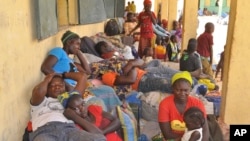The United Nations says a dramatic escalation in the conflicts raging in Africa's Sahel region has increased suffering for millions of people, many of whom were already living in difficult circumstances.
The United Nations says providing emergency humanitarian aid to millions of people in the Sahel has become more complex and dangerous.
It says problems of acute child malnutrition and food insecurity; of disease epidemics and natural disasters can no longer be tackled within a specific country alone. It says they have become regional problems and arise from the death, displacement and destruction of property caused by conflict.
The U.N. regional humanitarian coordinator for the Sahel, Robert Piper, said in a year the number of people displaced inside and outside their countries in the region has jumped from 1.6 million to 3.5 million.
He said they seek refuge in communities that are themselves extremely vulnerable.
“Southern Niger, the Difa region already has over half of its population food insecure, and it has now received a doubling of its population from displaced people from Nigeria; tremendous pressure on food, on water," said Piper. "Many of these people move with animals as well, so this very dangerous dynamic of displacement into acute vulnerability.”
Piper said other problem areas include Mali, where violence appears to be getting worse despite peace negotiations; Sudan's Darfur region, where renewed violence is pushing people into Chad; and the Central African Republic, where two-plus years of conflict shows no sign of coming to an end.
One of the worst ongoing conflicts is in northeast Nigeria, where the Boko Haram insurgency has displaced 1.3 million people. U.N. deputy humanitarian coordinator in Nigeria Munir Safieldin said many women and girls have been abducted and forced into sexual slavery.
He said it is believed nearly 1,000 women have been rescued from Boko Haram, but he warned they face a difficult reality.
“Some of these girls have been reported to be pregnant. Definitely these are unwanted pregnancies as a result of rape. And, some of them, I believe have been reported to have tested HIV-positive," said Safieldin.
"Definitely, we will need to scale-up very soon the level of psycho-social counseling for them. But, some of the challenges now are related to what are the options for them to re-integrate into society," he said. "Will they ever be able to pick up their life, get married, have their own children and their own life?”
The U.N. officials are pinning hopes on things getting better under incoming president Muhammadu Buhari, who has pledged a stronger military commitment to defeating Boko Haram.







